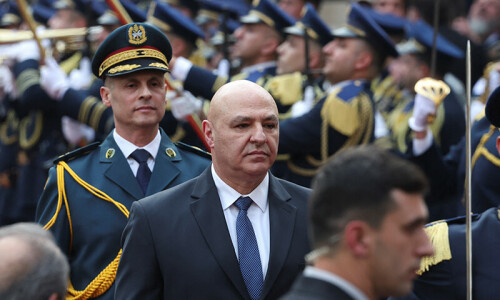PERHAPS one of the most sobering aspects of the aftermath of what happened in Derry, Northern Ireland, on Jan 30, 1972, is that it took almost four decades for the British state to explicitly acknowledge that the victims were blameless. Last weekend’s 50th anniversary commemorations of what has gone down in history as Bloody Sunday served as a reminder that many of the wounds remain raw. And for the bereaved families still hoping for justice, there’s little prospect of closure.
After British troops shot dead 13 participants in a peaceful civil rights march — from teenagers to a man in his 50s, but mostly on the younger side — the initial, untruthful, official narrative was that they were all members of the Irish Republican Army (IRA), who were armed and intended to do harm. It was even alleged that the troops came under fire before they shot back.
None of this nonsense would have withstood scrutiny had it been properly examined. However, the inquiry immediately launched by the government of Edward Heath and entrusted to John Widgery, the lord chief justice of England and Wales, who relied almost exclusively on military testimony, ignoring other eyewitness accounts, concluded that the shootings were justified.
The absurd findings were unquestioningly embraced by the British state and its unionist allies in Northern Ireland, with the connivance of the mainstream media. Irish nationalists knew better. The families of the victims, in particular, kept up their campaign for justice. It took 16 years for a second inquiry to be instituted, amid the momentum towards the Good Friday Agreement of 1998 — an interim resolution of the sectarian conflict that has bedevilled what is now the last significant British colony ever since it was carved out of the Irish Free State more than a century ago.
Bloody Sunday was the beginning of the end of the British empire.
Irish history since the 16th century is replete with rebellions, and the consistent resistance to British overlordship may help to explain why Protestant proselytisation failed to make inroads. Ireland remained resolutely Catholic, and Anglo-Scottish settlers accounted for much of the rival sect.
The Easter Rising of 1916 was defeated and the brutal repression that followed included the execution of James Connolly, the socialist internationalist who commanded the Irish Citizen Army and is remembered today as the founding father of the Irish Free State that followed five years later.
The matter of continued British occupation remained relatively dormant until the late 1960s, when the patience of Northern Irish Catholics with institutionalised discrimination ran out and the Provisional IRA emerged as a formidable force. Not surprisingly, it was invigorated by Bloody Sunday. The unprovoked massacre focused international attention on the predilections of the British state, but there was also angst within Britain. The popular reaction is reflected in a couple of songs released that year by a pair of estranged ex-Beatles. “Give Ireland back to the Irish/ Don’t make them have to take it away,” sang Paul McCartney, not known for his political interventions.
John Lennon was far more direct: “Is there anyone amongst you/ Dare to blame it on the kids?/ Not a soldier boy was bleeding when they nailed the coffin lids.” Lennon instinctively called out the lie that the soldiers came under fire before shooting back. It was confirmed by what became the longest and costliest inquiry in British history, delivering its findings in 2010. It completely exonerated the victims, who were neither armed nor violent.
It did not really help, though, in holding to account either those who gave the orders or those who fired the lethal bullets — some of which hit protesters in their backs, as they were evidently running away, while others were pumped into those who already lay wounded. A solitary prosecution against an unnamed soldier was dropped for lack of ‘admissible’ evidence.
A current British parliamentary bill intends to introduce a statute of limitations that would render all actions related to Northern Ireland’s ‘Troubles’ beyond the reach of the law, denying closure to hundreds of families depleted by actions of the British state and the rival unionist and nationalist paramilitaries. That would be a regressive move. But it probably won’t stall the momentum towards an eventual reunification of Ireland. The latest census is expected to reveal a Catholic majority in Northern Ireland, which in turn could produce a parliamentary majority at the Stormont assembly for Sinn Fein — which is already the largest single party in the Republic of Ireland’s parliament.
The unionists still fly their Union Jacks and paramilitary flags, but perhaps they are beginning to realise that they’re on the wrong side of history. They sometimes raise the Israeli flag, too — which can only serve as a reminder that the other side has consistently backed the Palestinian cause and other liberation struggles.
Published in Dawn, February 2nd, 2022












































